
The Cuban priest Leandro NaunHung, known for his community work in rural areas of Santiago de Cuba, which he highlights through his social media, expressed his dismay upon learning that the Cuban regime is preparing for future blackouts of over 72 hours, a scenario outlined in the recently enacted Decree 110.
“Enough! Lord, put an end to all this unnecessary suffering! Hurry your coming, if only for the Cubans! Come, and find us!” said the father of the Catholic Church, who shares difficulties and precarious solutions with the Cubans from rural and underserved areas.
Their comments were published on the Facebook page of CiberCuba, specifically in the post that reported on the Cuban regime's decision to establish a "special electricity contingency regime," which will be enacted whenever the national electric power system (SEN) is overwhelmed and on the verge of collapse. In such a scenario, the government will be able to plan blackouts lasting more than 72 hours.
With the publication this Tuesday in the Official Gazette of Decree 110, the government of Miguel Díaz-Canel formalizes a sort of "state of exception" that, much like the "states of alarm, exception, and siege" commonly found in the constitutions of many nations around the world, grants exceptional powers to authorities to address extraordinary and serious situations.
The new regulatory framework approved by the Cuban regime strengthens measures to control energy usage amid the current energy crisis affecting the Island, which has seen total collapses of the National Electric System lasting over 72 hours, such as the one that occurred on October 18 with the unexpected outage of the Guiteras power plant.
The approval of Decree 110 has sparked a wave of outrage and comments on social media. Presented as necessary to alleviate the unprecedented energy crisis the country is experiencing, the measure has been perceived by much of the population as yet another blow to their already precarious quality of life.
"This is never-ending! What's yet to come... December will be tough," expressed NaunHung on CiberCuba's social media, capturing the fear of many Cubans that there is still a long way to go before hitting rock bottom in the country's energy and structural crisis.
Frequently Asked Questions about Decree 110 and the Energy Crisis in Cuba
What is Decree 110 in Cuba?
Decree 110 is a regulation enacted by the Cuban government that establishes a "special electric contingency regime." This decree allows for planned blackouts lasting more than 72 hours when the national electric power system is exceeded and on the verge of collapse, granting exceptional powers to authorities to manage serious situations.
Why has Decree 110 been implemented?
Decree 110 has been implemented as a measure to address the severe energy crisis that Cuba is facing. The island has experienced total collapses of the electrical system, and this regulation aims to manage energy consumption during critical moments to prevent a complete system failure.
What has been the reaction of the Cuban population to Decree 110?
The reaction of the Cuban people has been one of indignation and discontent. The measure is seen as a new obstacle that worsens the already precarious quality of life in Cuba. Many citizens, such as the priest Leandro NaunHung, have expressed their frustration and fear on social media about the impact that these prolonged blackouts will have on their daily lives.
What implications does it have for the rural and disadvantaged areas of Cuba?
The rural and disadvantaged areas of Cuba are particularly vulnerable to the measures of Decree 110. These regions already face significant challenges, and prolonged blackouts can exacerbate resource shortages and further hinder access to basic services, complicating the daily lives of their residents.
Filed under: